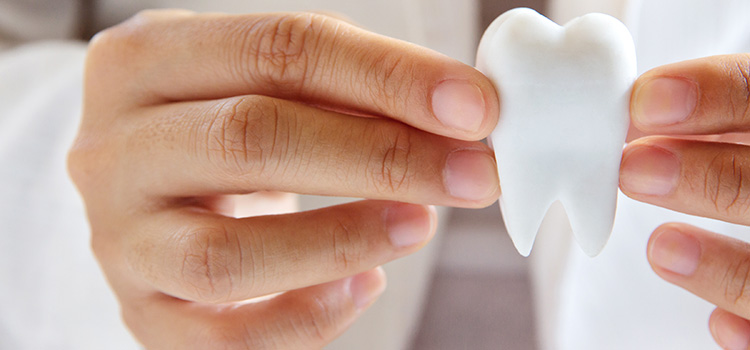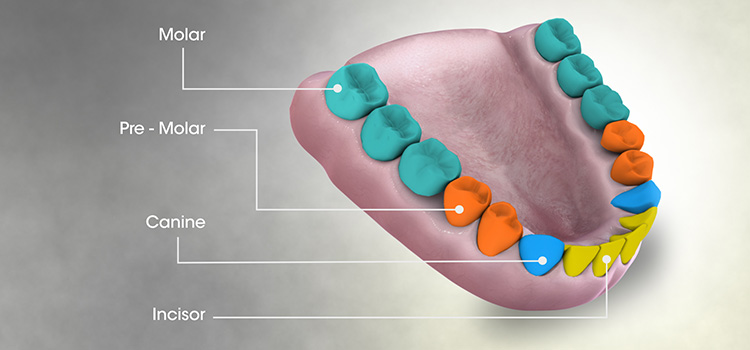Flat Teeth: Symptoms, Causes and Treatment
12th Apr 2020

Teeth may be tough, but they aren't invincible. Over time, their edges can flatten, leading to changes in your smile, bite, and even your face shape. Understand why this happens, why flat teeth might be a cause for concern, and what steps can protect your smile and oral health.

Dental Dimensions
To understand flat teeth, let’s review different types of teeth for context. When young children draw pictures with toothy grins, the teeth tend to be either flat boxes or jagged points. A glance in the mirror reveals that neither depiction is quite right, as teeth vary in size and shape. In fact, humans have four different types of teeth:
Incisors:
Your front teeth, or incisors, are in two groups of four at the center of the upper and lower jaw. Thin and straight, these eight teeth help you bite down, support the lips, and help you pronounce words.
Canines:
Positioned on either end of your incisors, the four canine teeth have distinctly pointy shapes. Sometimes called cuspids, they also support the soft tissues of the face and lips and help tear food when you chew.
Premolars:
Beyond the canines are the eight premolars (or bicuspids). These boxy teeth have broad, flatter tops with shallow dips that are perfect for chewing. They also help to maintain your facial shape.
Molars:
The biggest, widest teeth, the molars, lurk in the very back of your mouth. The four of these teeth at the back of the mouth are known as wisdom teeth, which many people have removed as teens or young adults. If you still have your wisdom teeth, then you have 12 molars that help you chew and support the structure of your face and mouth.

The Facts About Flat Teeth
With four types of teeth with four distinct silhouettes, you need to worry about flat teeth because of tooth wear. To understand tooth wear, let’s discuss enamel. Thanks to its high mineral content, the tooth enamel that makes up the outer layer of a tooth is the hardest material in the human body. It's actually harder than steel.
That durability allows it to withstand the constant friction and pressure that everyday activities like biting and chewing create. However, enamel isn't immune to force. Over time, it wears down, causing the biting surface to flatten and the tooth to shorten. This wear shows first at the edges of the teeth where they come together.
Here’s what drives tooth wear and causes teeth to flatten:
Friction:
Teeth-on-teeth contact causes friction. But chewing on other objects like toothpicks, pens, fingernails, or necklaces or habitually rubbing them against the teeth will do the same and possibly at higher rates. Over time, this friction wears away enamel, exposing the inner and more delicate tooth surfaces.
Pressure:
Enamel may be hard, but it's also brittle. Biting down or clenching the jaw can generate an amazing amount of force and put your teeth under an incredible amount of pressure. This is linked to chips, fractures, and broken teeth.
Weakened enamel:
Acidic foods and drinks soften enamel, leaving it more vulnerable to wear and tear. Plaque and decay can also attack teeth, causing cavities and weakened teeth.
Related Articles:
Why You Should Worry About Flattening Teeth
Flattening teeth are a cause for concern for a variety of reasons:
Dental damage:
When a tooth grows flatter and shorter, that’s a signal the protective enamel is wearing away. This leaves the tooth more vulnerable to chips, cracks, and breaks. It may also compromise the stability of any previous dental work, which increases the risk of failure for fillings and crowns and changes the fit of bridges and other appliances.
Pain and sensitivity:
Without the sturdy layer of enamel to safeguard them, the nerves within the teeth are more exposed. This leads to greater tooth sensitivity and discomfort.
Appearance changes:
If you've ever seen a denture wearer without their dentures, you understand the impact the teeth have on a person's facial shape. When teeth shorten, they offer less support to the tissues above them. This leads to sunken lips, sagging skin, and a jutting chin. Ultimately, shorter teeth tend to make you look older.
Bruxism:
Teeth that appear flatter or shorter are often a red flag for teeth grinding and jaw clenching, the telltale signs of bruxism. This is a progressively destructive and painful condition, but readily available treatments can protect your teeth and oral health.
The Trouble With Teeth Grinding
Dentists suspect bruxism when they find flat teeth because people with bruxism unconsciously grind their teeth and clench their jaws, which can flatten teeth. This repetitive behavior strains their teeth and the surrounding anatomy and accelerates the pace of wear and tear caused by regular chewing and clenching. The habitual overuse can lead to issues with the jaw's temporomandibular joint and trigger painful TMJ disorders. It can also damage the teeth, setting the stage for misalignments, chips, breaks, and flattened biting surfaces.
The causes of bruxism aren't completely understood. However, doctors believe stress and anxiety may be factors. Since it often runs in families, genetics are thought to play a role. Certain medications and medical conditions have also been cited as potential causes. Although we may be unsure about what spurs the development of bruxism, there's no question that it can damage your teeth.
Related Articles:
Smart Strategies to Fend off Flat Teeth
What can you do if you've noticed that your teeth seem flatter? Talking with your dentist is an important first step. They can check for signs of excessive tooth wear and help you pinpoint potential problems. If bruxism is diagnosed, they may suggest a night guard.
Night guards are oral appliances worn while sleeping that hold the jaw in a healthy position while gently separating the upper and lower teeth. Sometimes referred to as mouth guards or splints, they ease the strain on the jaw's joints and muscles and make the grinding action that flattens teeth impossible. They're easy to use, comfortable, affordable, and highly effective, so it's no wonder that many bruxism sufferers rely on them.
While night guards are useful in preventing additional damage, you'll need a different strategy to repair existing problems. If teeth that are flatter and shorter are throwing off your bite, wreaking havoc on your smile, or adding years to your appearance, talk with your dentist about restorative work like dental crowns, bridges, or veneers. However, it's vital that you take steps to treat the cause of the problem first. If you don't, the lifespan of any restorations will likely be shortened.

Protect Your Smile from Flat Teeth
Smiles, like teeth, come in a variety of shapes and sizes, but flattening teeth are a clear sign that the health of your smile may be at risk. As evidence of tooth wear, they signal a problem you need to address. If that problem is bruxism, fighting back is simple with a quality night guard.
Pro Teeth Guard makes obtaining a custom dental night guard easy and affordable. Simply choose the night guard that suits your needs, use the kit to take an impression, and receive a professionally crafted night guard. Get ready to protect your smile.
Sources:

- Most Popular
- Hard Outside, Soft Inside
- 2MM Thick
- Moderate / Heavy

- Most Durable
- Hard Materials
- 1.5MM Thick
- Heavy / Severe

- For Day Time Use
- Thin, Barely Visible
- 1MM Thick
- Light / Moderate

- For Clenching
- Flexible & Soft
- 1.5MM Thick
- Light / Moderate

